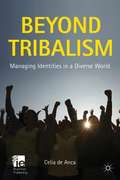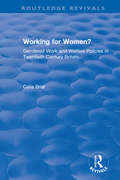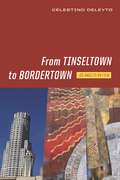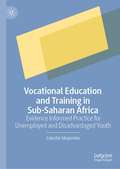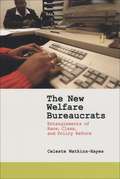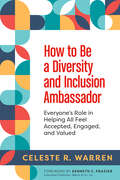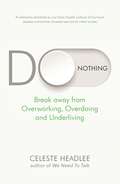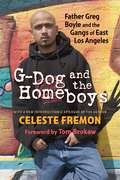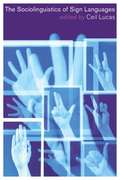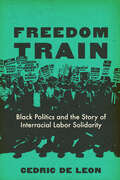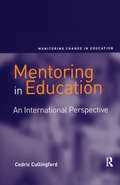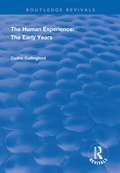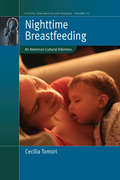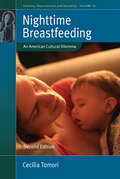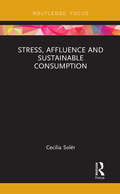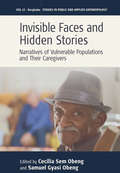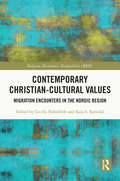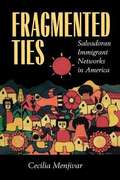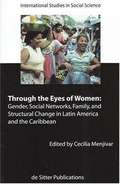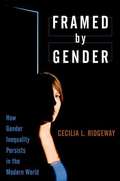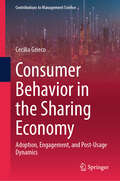- Table View
- List View
Beyond tribalism
by Celia De AncaIn the past, neo-tribalism in a Western context has been feared as leading to blindness or irrationality. In today's business world, tribalism represents a conscious separation of the individual ego for the good of the community. This is the key to understanding the success of the most innovative businesses in the 21st century.
Working for Women?: Gendered Work and Welfare Policies in Twentieth-Century Britain (Routledge Revivals)
by Celia BriarOriginally published in 1997 Working for Women? examines the ways in which women's patterns of paid and unpaid work have been mediated by the policies of governments throughout the 20th century. It looks at the state in defining what is women's work and men's work, and at equal pay and opportunities policies. This book will appeal to academics of sociology, gender and women’s studies.
Spoilsports: Understanding and Preventing Sexual Exploitation in Sport (Ethics and Sport)
by Celia BrackenridgeSexual exploitation in sport is a problem that has beset both male and female athletes privately for decades but which has only recently emerged as a public issue. Spoilsports is the first comprehensive review of this issue, integrating pioneering academic research, theoretical perspectives, and practical guidelines for performers, coaches, administrators and policy-makers.Key topics include:* 'moral panic'* children's rights* masculinity and power* making and implementing policy* leadership in sport.Spoilsports draws extensively on the personal experiences of athletes and those involved in sport. Challenging and controversial, this book represents an important step towards tackling a difficult issue. It is essential reading for coaches, athletes, parents, policy-makers and all those with a personal or professional interest in sport.
From Tinseltown to Bordertown: Los Angeles on Film (Contemporary Approaches to Film and Media Series)
by Celestino DeleytoLos Angeles is a global metropolis whose history and social narrative is linked to one of its top exports: cinema. L.A. appears on screen more than almost any city since Hollywood and is home to the American film industry. Historically, conversations of social and racial homogeneity have dominated the construction of Los Angeles as a cosmopolitan city, with Hollywood films largely contributing to this image. At the same time, the city is also known for its steady immigration, social inequalities, and exclusionary urban practices, not dissimilar to any other borderland in the world. The Spanish names and sounds within the city are paradoxical in relation to the striking invisibility of its Hispanic residents at many economic, social, and political levels, given their vast numbers. Additionally, the impact of the 1992 Los Angeles riots left the city raw, yet brought about changing discourses and provided Hollywood with the opportunity to rebrand its hometown by projecting to the world a new image in which social uniformity is challenged by diversity. It is for this reason that author Celestino Deleyto decided to take a closer look at how the quintessential cinematic city contributes to the ongoing creation of its own representation on the screen. From Tinseltown to Bordertown: Los Angeles on Film starts from the theoretical premise that place matters. Deleyto sees film as predominantly a spatial system and argues that the space of film and the space of reality are closely intertwined in complex ways and that we should acknowledge the potential of cinema to intervene in the historical process of the construction of urban space, as well as its ability to record place. The author asks to what extent this is also the city that is being constructed by contemporary movies. From Tinseltown to Bordertown offers a unique combination of urban, cultural, and border theory, as well as the author’s direct observation and experience of the city’s social and human geography with close readings of a selection of films such as Falling Down, White Men Can’t Jump, and Collateral. Through these textual analyses, Deleyto tries to situate filmic narratives of Los Angeles within the city itself and find a sense of the “real place” in their fictional fabrications. While in a certain sense, Los Angeles movies continue to exist within the rather exclusive boundaries of Tinseltown, the special borderliness of the city is becoming more and more evident in cinematic stories. Deleyto’s monograph is a fascinating case study on one of the United States’ most enigmatic cities. Film scholars with an interest in history and place will appreciate this book.
Vocational Education and Training in Sub-Saharan Africa: Evidence Informed Practice for Unemployed and Disadvantaged Youth
by Celestin MayombeThis book analyses the accessibility and success of vocational training programmes for unemployed and disadvantaged youth in Sub-Saharan Africa. Examining the implementation of vocational education and training programmes, the author assesses various internal and external enabling factors that can help foster youth employment. In doing so, the author presents a solid base for robust and evidence-informed practice and policy making for vocational training programmes, analysing such themes as employability skills, the labour market, and work-integrated learning. It also emphasises the importance of stakeholders taking into account the enabling and disabling environments found in a given local, regional or national context. It will be of interest to scholars of vocational training programmes in Sub-Saharan Africa and elsewhere, as well as of youth poverty and unemployment.
The New Welfare Bureaucrats: Entanglements of Race, Class, and Policy
by Celeste Watkins-HayesA behind-the-scenes look at bureaucracy's human face, The New Welfare Bureaucrats is a compelling study of welfare officers and how they navigate the increasingly tangled political and emotional terrain of their jobs.
How to Be a Diversity and Inclusion Ambassador: Everyone's Role in Helping All Feel Accepted, Engaged, and Valued
by Celeste R. WarrenUsing a proven three-part framework, this book shows how anyone-from a CEO to frontline employee-can play a pivotal role in creating a diverse and welcoming workplace.Creating a diverse workplace needs to be an ongoing effort, not just the subject of occasional training. As Celeste Warren says, needed change won't take place unless all employees feel that they have a role to play in creating the culture they would like to see in their organization. Regardless of what position you hold, you have the ability to impact change and create a more inclusive environment. Anyone can commit to becoming an unofficial Diversity and Inclusion Ambassador in his or her organization. Warren offers a straightforward three-stage model: Become aware of your strengths, weaknesses, and conscious and unconscious biases. Take an inventory of your surroundings: what is getting in the way of there being an inclusive environment in your organization? Develop a personal action plan.Depending on your position, the actions you take can be as simple as consistently raising DEI-related issues in staff meetings or as far-reaching as leading an Employee Resource Group or developing a new hiring policy. In separate chapters, Warren offers specific advice for chief diversity and inclusion officers, C-suite leaders, first-line managers, human resources practitioners, and individual contributors. This book features examples, exercises, and practical tools that show you how to assess where your organization is at and develop a purpose and strategy that can make diversity a workplace reality.
Do Nothing: Break Away from Overworking, Overdoing and Underliving
by Celeste HeadleeWe work feverishly to make ourselves happy. So why are we so miserable? This manifesto helps us break free of our unhealthy devotion to efficiency and shows us how to reclaim our time and humanity with a little more leisure.'This book is so important and could truly save lives . . . With intelligence and compassion, Headlee presents realistic solutions for how we can reclaim our health and our humanity from a technological revolution that seems hell-bent on destroying both. I'm so grateful to have read this book. It delivers on its promise of a better life' - Elizabeth Gilbert, bestselling author of Big Magic and Eat, Pray, LoveDespite our constant search for new ways to 'hack' our bodies and minds for peak performance, human beings are working more instead of less, living harder not smarter, and becoming more lonely and anxious. We strive for the absolute best in every aspect of our lives, ignoring what we do well naturally. Why do we measure our time in terms of efficiency instead of meaning? Why can't we just take a break?In Do Nothing, award-winning journalist Celeste Headlee illuminates a new path ahead, seeking to institute a global shift in our thinking so we can stop sabotaging our well-being, put work aside and start living instead of doing. The key lies in embracing what makes us human: our creativity, our social connections (Instagram doesn't count), our ability for reflective thought, and our capacity for joy. Celeste's strategies will allow you to regain control over your life and break your addiction to false efficiency, including:-Increase your time perception and determine how your hours are being spent. -Stop comparing yourself to others.-Invest in quality idle time. Take a hot bath and listen to music.-Spend face-to-face time with friends and familyIt's time to recover our leisure time and reverse the trend that's making us all sadder, sicker, and less productive.
G-Dog and the Homeboys: Father Greg Boyle and the Gangs of East Los Angeles
by Celeste FremonFather Gregory J. Boyle, SJ, is a native of Los Angeles, a Jesuit priest, and founder of Homeboy Industries, an economic development and jobs program begun in 1988 for at-risk and gang-involved youth. "A great many kids in my neighborhood don't plan their futures; they plan their funerals." G-Dog and the Homeboys presents the story of Boyle's unconventional ministry and its extraordinary successes. In this expanded, updated edition, Celeste Fremon has returned to East L.A. to report on gang members she first profiled fifteen years ago. Using their individual stories as models, she examines what policy makers should know about gang intervention now, years later.
Sociolinguistics and Deaf Communities
by Ceil Lucas Adam C. SchembriHow do people use sign languages in different situations around the world? How are sign languages distributed globally? What happens when they come in contact with spoken and written languages? These and other questions are explored in this new introduction to the sociolinguistics of sign languages and deaf communities. An international team brings insights and data from a wide range of sign languages, from the USA, Canada, England, Spain, Brazil and Australia. Topics covered include multilingualism in the global deaf community, sociolinguistic variation and change in sign languages, bilingualism and language contact between signed and spoken languages, attitudes towards sign languages, sign language planning and policy, and sign language discourse. Sociolinguistics and Deaf Communities will be welcomed by students of sign language and interpreting, teachers of sign language, and students and academics working in linguistics.
The Sociolinguistics of Sign Languages
by Ceil LucasThis is an accessible introduction to the major areas of sociolinguistics as they relate to sign languages and deaf communities. Clearly organized, it brings together a team of leading experts in sign linguistics to survey the field, and covers a wide range of topics including variation, multilingualism, bilingualism, language attitudes, discourse analysis, language policy and planning. Each chapter introduces the key issues in each area of inquiry and provides a comprehensive review of the literature. The book also includes suggestions for further reading and helpful exercises.
Freedom Train: Black Politics and the Story of Interracial Labor Solidarity
by Cedric De LeonRevealing the central role of Black activists in spurring interracial solidarity in the US labor movement. Most accounts of interracial solidarity focus on white union activists. In Freedom Train, Cedric de Leon, a former organizer and elected leader in the US labor movement, argues that we can't comprehend the history of workers' triumphs in the United States without investigating the role of Black liberation. This book shows that, from the early twentieth century to the years immediately following the March on Washington and beyond, independent Black labor organizations have pushed the white labor movement toward a fierce and effective interracial solidarity. Drawing on the minutes, correspondence, and speeches of Black labor activists and organizations from 1917 to 1968, de Leon reveals that Black people have been the most ardent and consistent proponents of racial inclusion, leadership representation, and programs linking economic and racial justice. He also demonstrates how conflict and consensus among Black labor groups fueled the fight for solidarity, as different factions split and consolidated to form successive and sometimes competing Black labor organizations. Freedom Train centers the contributions of Black people to the multiracial unions we have today and demonstrates that internal conflict can be a source of strategic innovation and social movement success.
Mentoring in Education: An International Perspective (Monitoring Change In Education Ser.)
by Cedric CullingfordMentoring has become a hot topic in a number of professional spheres in recent years, but its most important and longest-established location is in education. However, this volume is the first wide-ranging academic critique of the concept and its application. Offering both a critical and a practical stance, the authors examine the historical and cultural aspects of mentoring and the motivations behind it. They also explore the effects on the individuals involved and on the system, and examine the different approaches to the idea and implementation of mentoring. Drawing contributions from Europe, the USA and the Middle East, this work considers a wide range of empirical studies of mentoring from those countries that have invested in it, including case studies and analyses of current practice. The book makes a major contribution, not only on account of the international perspective it provides but also through analysis of cases in order to establish the difference between the much-vaunted theoretical advantages promoted by policy makers and the everyday realities and complexities that arise in a scheme entirely dependent on personal relationships.
The Human Experience: The Early Years (Routledge Revivals)
by Cedric CullingfordFirst published in 1999, the focus of this ground-breaking study is on representing the mental world of the child with unprecedented clarity. Cedric Cullingford aims to show that this world, in its normal experience by children, is significantly unlike what we typically assume it to be, and significantly unlike anything exposed by the most prominent research programs. Querying common assumptions about children’s thinking, Cullingford begins with an outline of children’s understanding which emphasizes its range and complexity, along with an address of the mythology of children’s intellectual incapacity and preparation for the approach to be taken in detailing children’s construction of a sense of their world. The following four chapters combine to construct a description of how children approach their world, exploring theory of mind, the self, the family, the school and then the wider social and physical worlds. Cullingford achieves a vividness, immediacy and intensity not seen elsewhere, using the constant medium of the child’s gaze and demonstrating that the youngest child is not simply responsive but is active and critical in interrogating the world.
Nighttime Breastfeeding: An American Cultural Dilemma (Fertility, Reproduction and Sexuality: Social and Cultural Perspectives #26)
by Cecília TomoriNighttime for many new parents in the United States is fraught with the intense challenges of learning to breastfeed and helping their babies sleep so they can get rest themselves. Through careful ethnographic study of the dilemmas raised by nighttime breastfeeding, and their examination in the context of anthropological, historical, and feminist studies, this volume unravels the cultural tensions that underlie these difficulties. As parents negotiate these dilemmas, they not only confront conflicting medical guidelines about breastfeeding and solitary infant sleep, but also larger questions about cultural and moral expectations for children and parents, and their relationship with one another.
Nighttime Breastfeeding: An American Cultural Dilemma (Fertility, Reproduction and Sexuality: Social and Cultural Perspectives)
by Cecília TomoriNew parents in the United States are caught between responding to infant needs for closeness and breastfeeding, and cultural and medical norms that emphasize solitary sleep. This anthropological investigation shows that nighttime closeness and breastfeeding are the evolutionary and cross-cultural norm, but recent sociocultural shifts produced novel ideals of separation. The book uncovers how breastfeeding parents rework these cultural ideals. In this new edition, the author describes shifting medical guidance that increasingly supports breastfeeding yet remains largely separated from infant sleep guidance. The volume also provides a path towards more equitable approaches to nighttime infant care grounded in reproductive justice.
Stress, Affluence and Sustainable Consumption (Routledge Studies in Sustainability)
by Cecilia SolérWhy do affluent consumers almost automatically acquire new versions or variations of products already at their disposal? Even though most of us know that this novelty consumption poses a serious threat to an environmentally and socially sustainable future, we continue to do it. Why? Research shows that consumption of new automobiles, clothing, furniture, electronics, home furnishing, household apparel, mobile phones, etc., is motivated by a desire to feel more secure, less anxious and better mood-wise. Affluent consumers seem to engage in novelty consumption not to feel better but rather to avoid feeling bad. Stress, Affluence and Sustainable Consumption discusses sustainable consumption from a stress perspective, adding an embodied understanding to the sustainability-related consumption challenges that we face today. A stress perspective on affluent consumption differs from current understandings on consumption, as it fully acknowledges the consumer as having a body (including a mind) that reacts to the numerous product offerings and retail spaces, both physical and online. A stress perspective can explain how our bodies try to cope with an overload of perceptual input provided by advertising messages, product launches and even store structures. This book will be of great interest to students and researchers of consumer psychology, sustainable consumption studies, sustainable marketing and markets as well as sustainable development more generally.
Invisible Faces and Hidden Stories: Narratives of Vulnerable Populations and Their Caregivers (Studies in Public and Applied Anthropology #12)
by Cecilia Sem Obeng and Samuel Gyasi ObengDealing with narratives of vulnerable populations, this book looks at how they deal with dimensions of their social life, especially in regard to health. It reflects the socio-political ecologies like public hostility and stereotyping, neglect of their unique health needs, their courage to overcome adversity, and the love of family and healthcare providers in mitigating their problems. The narratives inform us about the dissimilarity between the way we speak, what we hear and how we act. American society likes to give the impression that it is listening to the plight of vulnerable populations, but the stories in this volume prove otherwise.
Contemporary Christian-Cultural Values: Migration Encounters in the Nordic Region (Religion, Resistance, Hospitalities)
by Cecilia NahnfeldtThis book reconstructs the connection between religion and migration, drawing on post-colonial perspectives to shed light on what religion can contribute to migrant encounters. Examining the resources and motives for hospitality as lived in Christian contexts in the Nordic region, it addresses the content of talk about "religion" in public discourse, the concept having become something of an empty signifier in debates surrounding migration. Multidisciplinary in approach, this volume demonstrates that "religion" is not, in fact, an empty signifier, but gains substance through practice and interpretation. Considering the undeveloped potentiality of religion and the manner in which the unseen religious perspective in secularity becomes manifest in practice, this volume will appeal to social scientists and scholars of religion with interests in migration, refugee studies, theology, and Christian practice.
Fragmented Ties: Salvadoran Immigrant Networks In America
by Cecilia MenjivarIn one of the most comprehensive treatments of Salvadoran immigration to date, Cecilia Menjívar gives a vivid and detailed account of the inner workings of the networks by which immigrants leave their homes in Central America to start new lives in the Mission District of San Francisco. Menjívar traces crucial aspects of the immigrant experience, from reasons for leaving El Salvador, to the long and perilous journey through Mexico, to the difficulty of finding work, housing, and daily necessities in San Francisco. Fragmented Ties argues that hostile immigration policies, shrinking economic opportunities, and a resource-poor community make assistance conditional and uneven, deflating expectations both on the part of the new immigrants and the relatives who preceded them. In contrast to most studies of immigrant life that identify networks as viable sources of assistance, this one focuses on a case in which poverty makes it difficult for immigrants to accumulate enough resources to help each other. <p><p> Menjívar also examines how class, gender, and age affect immigrants' access to social networks and scarce community resources. The immigrants' voices are stirring and distinctive: they describe the dangers they face both during the journey and once they arrive, and bring to life the disappointments and joys that they experience in their daily struggle to survive in their adopted community. "Menjivar painstakingly describes the 'downside' of immigrant networks. Although there are exceptions in early accounts of the Chicago School of Sociology, nothing similar exists for recent migrants. It is a polished integration of ethnographic research and imagination, not a description of a localized phenomenon. For that reason, this book has significant implications for sociological analysis and it will be read extensively. . . I can imagine it used not only for further exploration of issues of interest to specialists, but also as a tool to instruct students and the wider public about the details of immigrant adaptation."—Patricia Fernandez-Kelly, Princeton University Department of Sociology and Office of Population Research "Framented Ties provides a nuanced and critical analysis of the complexity of immigrant social networks. . . .This astute study of the underside of networks -- and of their differentiation by gender, generation, and social class -- is a gem of an ethnography that will challenge conventional wisdom on the subject. . . .It is an illuminating look at a significant population -- the Salvadorans -- that has almost imperceptibly become one of the largest Latin American groups in the United States."—Ruben G. Rumbaut, co-author of Immigrant America: A Portrait "This is the first book on Salvadorans living and working in California, and it is a treasure. Based on meticulously collected research materials, this ethnography offers one of the most compelling and complex analyses of social networks. Revealing the fluid nature of social networks and the ways in which the intersections of generation, gender and class conspire to both help and hinder Salvadorans' opportunities in the United States, Cecilia Menjivar's book promises to make lasting contribution to the way we think about immigration." —Pierrette Hondagneu-Sotelo, author of Doméstica
Through The Eyes Of Women: Gender, Social Networks, Family And Structural Change In Latin America And The Caribbean
by Cecilia MenjivarThis volume examines the effects of neoliberal reforms on daily life in Latin America and the Caribbean, as seen through the eyes of women. The contributions in this volume situate women in their sociocultural milieus, so that women's perceptions and assessments are examined through a lens that includes the lives of other women, men and other members of the women's families, work settings, communities, and political and religious organizations.
Non-State Actors, Soft Law and Protective Regimes: From the Margins
by Cecilia M. BaillietBy offering critical perspectives of normative developments within international law, this volume of essays unites academics from various disciplines to address concerns regarding the interpretation and application of international law in context. The authors present common challenges within international criminal law, human rights, environmental law and trade law, and point to unintended risks and consequences, in particular for vulnerable interests such as women and the environment. Omissions within normative or institutional frameworks are highlighted and the importance of addressing accountability of state and non-state actors for violations or regressions of minimum protection guarantees is underscored. Overall, it advocates harmonisation over fragmentation, pursuant to the aspiration of asserting the interests of our collective humanity without necessarily advocating an international constitutional order.
Framed by Gender: How Gender Inequality Persists in the Modern World
by Cecilia L. RidgewayIn an advanced society like the U.S., where an array of processes work against gender inequality, how does this inequality persist? Integrating research from sociology, social cognition and psychology, and organizational behavior, Framed by Gender identifies the general processes through which gender as a principle of inequality rewrites itself into new forms of social and economic organization. Cecilia Ridgeway argues that people confront uncertain circumstances with gender beliefs that are more traditional than those circumstances. They implicitly draw on the too-convenient cultural frame of gender to help organize new ways of doing things, thereby re-inscribing trailing gender stereotypes into the new activities, procedures, and forms of organization. This dynamic does not make equality unattainable, but suggests a constant struggle with uneven results. Demonstrating how personal interactions translate into larger structures of inequality, Framed by Gender is a powerful and original take on the troubling endurance of gender inequality.
Status: Why Is It Everywhere? Why Does It Matter?
by Cecilia L. RidgewayStatus is ubiquitous in modern life, yet our understanding of its role as a driver of inequality is limited. In Status, sociologist and social psychologist Cecilia Ridgeway examines how this ancient and universal form of inequality influences today’s ostensibly meritocratic institutions and why it matters. Ridgeway illuminates the complex ways in which status affects human interactions as we work together towards common goals, such as in classroom discussions, family decisions, or workplace deliberations. Ridgeway’s research on status has important implications for our understanding of social inequality. Distinct from power or wealth, status is prized because it provides affirmation from others and affords access to valuable resources. Ridgeway demonstrates how the conferral of status inevitably contributes to differing life outcomes for individuals, with impacts on pay, wealth creation, and health and wellbeing. Status beliefs are widely held views about who is better in society than others in terms of esteem, wealth, or competence. These beliefs confer advantages which can exacerbate social inequality. Ridgeway notes that status advantages based on race, gender, and class—such as the belief that white men are more competent than others—are the most likely to increase inequality by facilitating greater social and economic opportunities. Ridgeway argues that status beliefs greatly enhance higher status groups’ ability to maintain their advantages in resources and access to positions of power and make lower status groups less likely to challenge the status quo. Many lower status people will accept their lower status when given a baseline level of dignity and respect—being seen, for example, as poor but hardworking. She also shows that people remain willfully blind to status beliefs and their effects because recognizing them can lead to emotional discomfort. Acknowledging the insidious role of status in our lives would require many higher-status individuals to accept that they may not have succeeded based on their own merit; many lower-status individuals would have to acknowledge that they may have been discriminated against. Ridgeway suggests that inequality need not be an inevitable consequence of our status beliefs. She shows how status beliefs can be subverted—as when we reject the idea that all racial and gender traits are fixed at birth, thus refuting the idea that women and people of color are less competent than their male and white counterparts. This important new book demonstrates the pervasive influence of status on social inequality and suggests ways to ensure that it has a less detrimental impact on our lives.
Consumer Behavior in the Sharing Economy: Adoption, Engagement, and Post-Usage Dynamics (Contributions to Management Science)
by Cecilia GriecoThe book examines the essential aspects of consumer behavior within the sharing economy. This thorough analysis covers the pre-adoption, active usage, and post-adoption phases, offering a comprehensive view of the consumer journey. The research is based on an extensive literature review, highlighting key elements and emphasizing the consumer perspective through original quantitative and qualitative studies across various industries. Researchers will find the theoretical advancements and cutting-edge insights invaluable. Platform managers will gain a deeper understanding of consumer behavior, enabling them to refine strategies throughout the purchasing process. Marketing professors can use this book as a primary textbook or supplementary reading for their courses. Key topics include the drivers of adoption, trust issues, satisfaction, and user retention, along with theoretical frameworks that uniquely define the phenomenon of the sharing economy and the specificities of consumer behavior within this domain.
